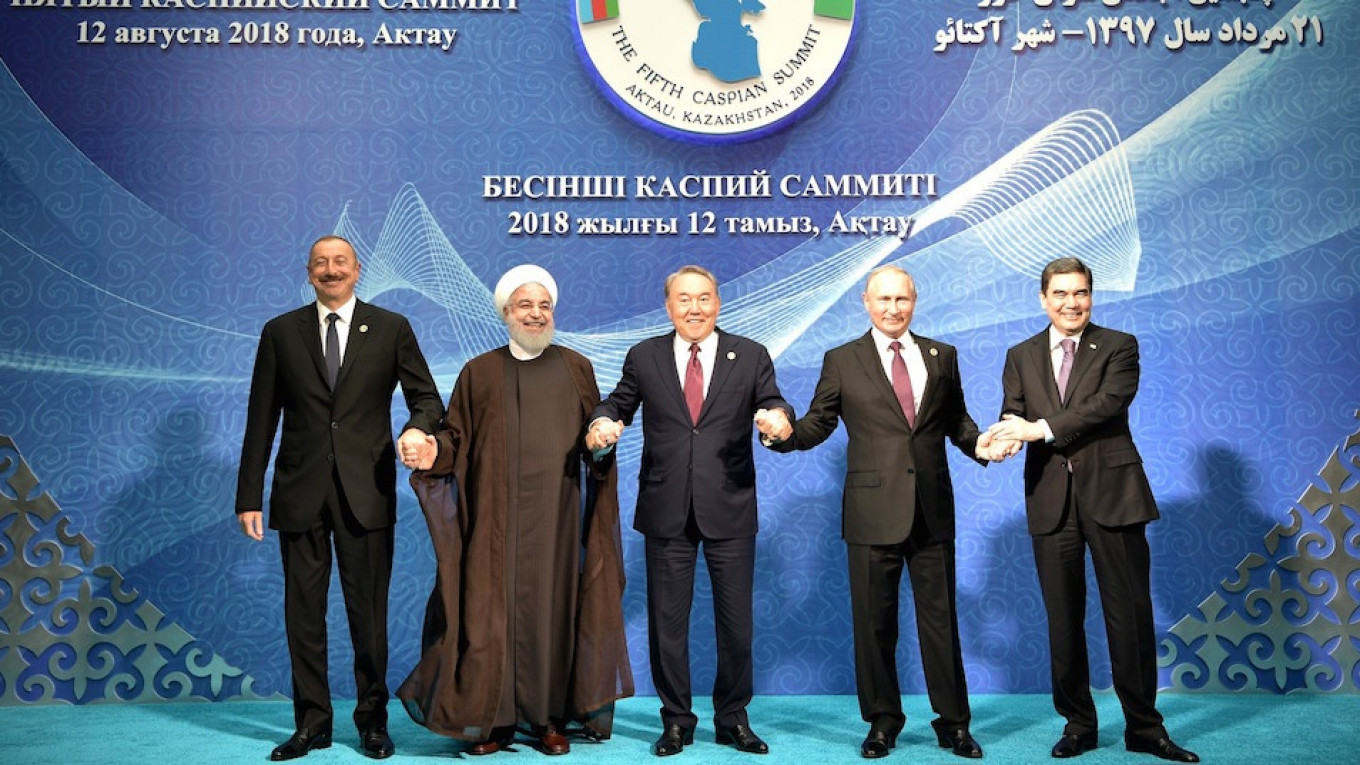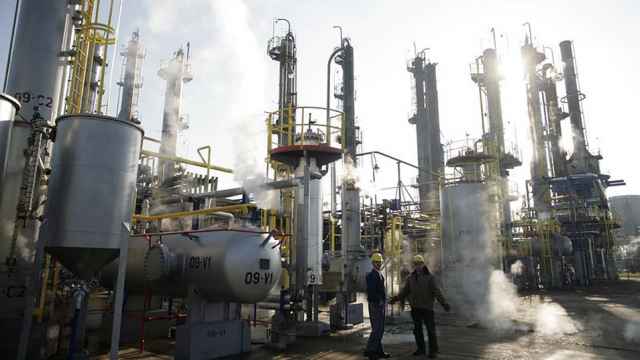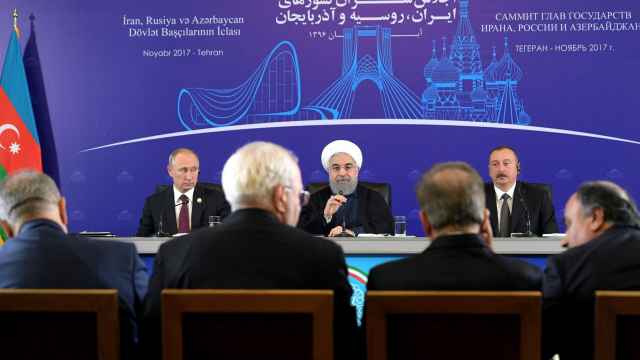The Caspian Sea agreement will make it easier to develop disputed oil fields in the Caspian and to construct a gas pipeline between signatories, but there is still more to be negotiated to conclusively divide up the world’s largest inland body of water and its natural resources.
Russia, Iran, Kazakhstan, Azerbaijan and Turkmenistan signed an agreement on Aug. 12 in Aktau, Kazakhstan to split the Caspian Sea into territorial zones. The landlocked water mass used to be neatly split between Iran and the Soviet Union, but the emergence of new countries after the collapse of the Soviet Union created a need for new negotiations.
What remains to be seen is whether the Caspian Sea agreement is the best system to settle military or mineral disputes between Russia, Kazakhstan, Turkmenistan, Azerbaijan and Iran.
For example, Article Eight of the treaty allows the water to be divided along standards already in use. Other agreements between Russia, Kazakhstan and Azerbaijan for developing subsea resources in the Caspian decide a boundary by setting out a modified median line so that a border runs between oilfields (proven or prospective), rather than across them. If a state stands to lose part of a field in order to secure a practical boundary, it is compensated with a proportionate role in field development.
But under former President Saparmurat Niyazov, Turkmenistan insisted on the application of its own, unique concept, demanding that only baseline points on an east-west axis should be used. In practice, this meant that the boundary line in the middle of the Caspian would always have to be exactly midway on an east-west axis, which fails to take account of the impact that the Caspian’s jagged coastline and island chains have in altering the subsea boundary line.
Niyazov’s proposal allowed him to claim that parts of Azerbaijan’s Azeri-Chirag-Guneshli field complex lay within Turkmen waters. But using the nearest baseline point, a standard system in maritime boundary making, places the field entirely in Azerbaijani waters. Meanwhile, using the modified median line principle, it would be reasonable to expect that all of the disputed field known to the Turkmens as Serdar and to the Azerbaijanis as Kyapaz, would be allocated to Turkmenistan. This level of agreement requires complex bilateral negotiations, and previous Azerbaijani approaches about possible joint field development failed to yield positive results.
The agreement may also help resolve the dispute over a field known by Azerbaijan as Alov and which the Iranians know as Alborz. In 1998, Baku awarded the British BP oil company a production sharing agreement (PSA) for the Araz-Alov-Sharg field cluster, but when an Iranian gunboat intercepted two survey vessels at Alov in July 2001, BP suspended all offshore activities. By early 2016, the PSA had been effectively terminated.
The accord could also settle the future of the Sardar Jangal (also called Sardar-e-Jangal) field. When Tehran announced the discovery of the field in Dec. 2011, initial reports said it contained about 1.4 trillion cubic meters of gas and some 8-10 billion barrels of oil, though these estimates have since been reduced. Because Tehran has not disclosed the field’s exact coordinates, it is not clear whether — on a standard median line basis — it might extend into either or both Azerbaijani and Turkmen subsea zones. Baku believes it does cross the subsea boundary and has so far prevailed on Tehran to withhold any development pending a Caspian Sea agreement.
Then there is the issue of trans-Caspian oil and gas transportation. Article 14 provides for pipelines to be laid on the bottom of the sea. Crucially, it avoids any suggestion that the five signatory states be allowed to veto where a pipeline is laid. All it insists on is, quite reasonably, that pipeline plans meet international environmental standards.
In legal terms, once adopted, this clears the way for the development of the proposed Trans-Caspian Gas Pipeline. But Turkmenistan still has to overcome its own internal regulations that say all gas produced in Turkmenistan must also be processed in the country. The most obvious approach, in commercial terms, would be for gas from Turkmenistan’s Block One to be connected directly to Azerbaijan’s offshore gas pipeline network and then piped to Azeri processing facilities at Sangachal, a connection of less than 100 kilometers.
But Ashgabat has so far insisted that gas produced at Block One must be processed onshore before heading across the water again to Azerbaijan; in effect requiring a full 350-kilometer travel line from coast to coast. In an era of tight gas prices and a need for cost savings wherever possible, Turkmenistan would have to change its approach to take advantage of any movement towards a trans-Caspian pipeline.
Lastly, the agreement will make it much easier to ensure the protection of environmental and ecological issues. One example: sturgeon fishing appears to only be managed responsibly by Iran. A clear common regime for the waters of the central Caspian will, with luck, result not only in stricter quotas for sturgeon fishing, but also for stricter enforcement of those quotas.
Russia gains both practically and psychologically. The agreement keeps foreign military forces out of the Caspian, and so reduces the ability of an antagonist to develop regional alliances that could threaten an attack from the south. Russia also gains diplomatically and psychologically as it appears that it was Moscow that largely drafted the final text and brokered an agreement ending a 25-year old impasse.
John M. Roberts is a nonresident senior fellow at Atlantic Council's Eurasia Center and Global Energy Center. The views and opinions expressed in opinion pieces do not necessarily reflect the position of The Moscow Times.
A Message from The Moscow Times:
Dear readers,
We are facing unprecedented challenges. Russia's Prosecutor General's Office has designated The Moscow Times as an "undesirable" organization, criminalizing our work and putting our staff at risk of prosecution. This follows our earlier unjust labeling as a "foreign agent."
These actions are direct attempts to silence independent journalism in Russia. The authorities claim our work "discredits the decisions of the Russian leadership." We see things differently: we strive to provide accurate, unbiased reporting on Russia.
We, the journalists of The Moscow Times, refuse to be silenced. But to continue our work, we need your help.
Your support, no matter how small, makes a world of difference. If you can, please support us monthly starting from just $2. It's quick to set up, and every contribution makes a significant impact.
By supporting The Moscow Times, you're defending open, independent journalism in the face of repression. Thank you for standing with us.
Remind me later.






